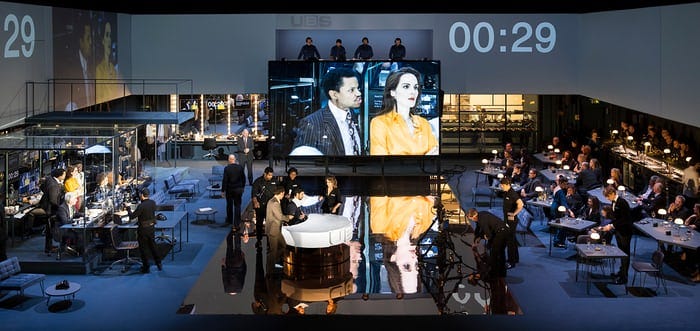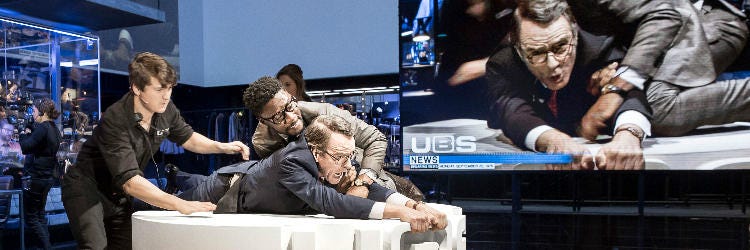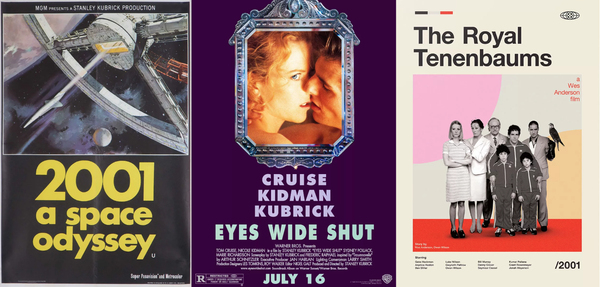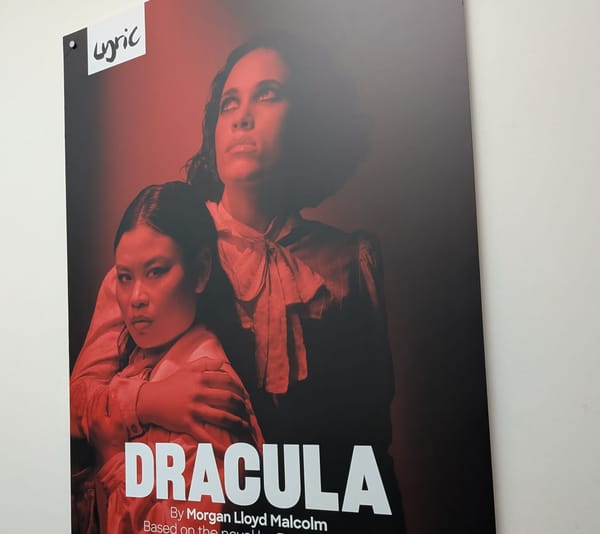National Theatre: Network
Hi-tech revival of Oscar cult classic
Network, the motion picture, won an Oscar for best screenplay in 1976. Most of those involved have been forgotten by all but the keenest film buff, except for Faye Dunaway and Robert Duvall. Dunaway also won best female actor and Beatrice Straight won best supporting female actor. The lead actor, news anchorman Howard Beale around whom the entire film is based, was played by Peter Finch: an Australian who won the best actor Oscar posthumously. The film has now been revived as a play at London’s National Theatre, filled with technical wizardry and anchored by Breaking Bad’s Bryan Cranston.

If it is remembered at all, Network’s abiding contribution to Western culture is Howard Beale’s angry catchphrase: I’m mad as hell and I’m not going to take this any more.
This revival is an angry production too. It documents the breakdown and mental anguish suffered by the middle-aged, disillusioned career newsman. He knew Edward R. Murrow for chrissakes! He’s worked at the top of his game for decades and now, finding himself out of touch, a little too old, a little dull, all those usual reasons given for redundancy that are really code for saving money, have caught up with him.
Howard is sacked by his lifelong friend Max Schumacher. It isn’t long before Schumacher is then sacked, and the two find themselves facing an uncertain but certainly bleak future. In the bar, Howard jokes that he might have to kill himself. Everyone laughs, which proves to be a mistake. It emboldens Howard. He announces that he is going to shoot himself live on air one week later, during his final appearance.
Of course, nobody in the control booth hears him, they’re all too busy. Once the grim reality sinks in, several of the crew try to cut Howard short. A fracas ensues, and the last thing we see before the screen goes dark is an executive, foaming at the mouth, shouting profanities, and Howard grimly clinging to his desk by his finger nails. Of course, the image is broadcast around the world.

This being a movie and one set in a TV newsroom, it’s important that the stage production has retained the key components. There are big screens all over the stage, and camera operators are part of the cast. Perhaps surprisingly, and not entirely logically, the right-hand third of the stage is set as a restaurant. Tables were booked by paying guests, not actors, which given the violence and anger that runs through the play made a few points even more dramatic than they would have been.
For example, Dunaway’s character is the strikingly attractive and terminally ambitious Diana Christensen. In London, this part is played by the brilliant Michelle Dockery. Schumacher and Christensen begin one scene outside the theatre by the Thames, broadcast into the auditorium by cameras. As they walk, it becomes clear that they are moving towards the stage. Unbroken and uncut, talking all the time, Christensen then seduces Schumacher and, still talking about her plans for the Howard Beale show, has sex with him in the restaurant in amongst the other diners. The gunman who brings the show to a close likewise involves the diners, waving his weapon in their direction. One can only hope they had all seen the film first.
The plot trick at the heart of Network is of course that Howard Beale’s suicide stunt dramatically improves his ratings. As his own health and well-being plummet, his TV show becomes yet more popular. He is by turns an exhibitionist, a curmudgeon and eventually reinvents himself as a messianic godhead, a prophet for the modern age. The surprise, and surely the reason this story has been revived now, is that much of what Howard predicts has actually happened since 1976. Yes, it does feel like IBM (or its modern analogues, Google and Apple) rule the government. It does feel like big oil is too influential. But just as these predictions were premature in 1976, they are premature again. The extremes predicted by Beale have never quite come to pass. True, there is a lot to be angry about, there always has been, but the very worst excesses have not materialised. It might not sound very bold, but things could very definitely be very much worse than they are now. Not a happy thought, but one that is less chaotic than the worldview put forward by Howard.
The last word went to the audience. As we walked out, we were treated to footage of various US Presidential inaugurations. It seems likely that a lot of the audience didn’t remember Reagan. It wasn’t until Obama that there were supportive cheers, and Trump predictably caused boos. Someone even shouted Howard Beale’s Mad As Hell catchphrase, and someone else was profane. It caused spontaneous laughter around the theatre, and we all left feeling optimistic because we were the few that left our TVs at home for the night.
The cast were magnificent. Bryan Cranston was equal to the script and every bit as good as Peter Finch’s Oscar-winning performance. He looks like an actor who has spent his whole life on stage, rather than the surprise star of an early boxed set success. The technical complexity of the live broadcast equipment and the on-stage kitchen (it’s not only the diners who sit on the stage) are a monumental achievement that sets a high bar for future productions. Theatre has a lot more competition for our wallets than it ever had, and it’s heartening to see such a big cast and backstage crew working together to such grand effect. We look forwards to what director Ivo van Hove does next.
Network is at the end of its current run in London, but the movie is widely available.





